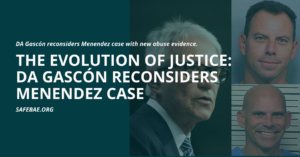The Evolution of Justice: DA Gascón Reconsiders Menendez Case
DA Gascón reconsiders Menendez case with new abuse evidence.
A New Chapter in the Menendez Brothers Case: The Evolution of Justice
Over 30 years after their conviction for the murders of their parents, the Menendez brothers’ case is once again making headlines. Just yesterday, Los Angeles District Attorney George Gascón acknowledged a shift toward a “modern understanding of sexual violence,” particularly in cases where trauma may affect victims’ behavior. “Our office has developed a more evolved approach to cases involving alleged sexual violence,” Gascón stated, emphasizing that such trauma has profound effects, which the legal system now takes more seriously than it did decades ago. He also acknowledged that sexual violence is a pervasive issue impacting individuals across gender identities and reaffirmed his office’s commitment to supporting all victims as they seek justice.
Trauma-Informed Justice
For decades, society often dismissed or misunderstood the complex dynamics of abuse, especially when it came to the violent actions of its victims. But today, the legal system is gradually evolving to recognize that prolonged abuse can deeply affect how individuals react to their trauma. The Menendez brothers’ story, which gripped the nation in the early 1990s, is now being reconsidered under this new lens of trauma-informed justice. The decision that lies ahead could potentially lead to a re-sentencing that reflects not only the facts of the case but also the shifts in our collective understanding of sexual violence and its profound impact.
Gascón’s statement reflects a growing awareness of how prolonged abuse can shape a person’s actions, potentially shedding new light on the brothers’ claims of abuse by their father, José Menendez. The newly surfaced evidence—including Erik’s letter to a cousin detailing alleged abuse and the testimony of a former Menudo band member who also accuses José Menendez—illustrates that abuse survivors were often misunderstood or dismissed in past legal proceedings.
A Modern Understanding of Sexual Violence and Trauma
Over the last few decades, society’s understanding of sexual violence has dramatically evolved. What was once dismissed as mere allegations or personal grievances is now recognized as deeply traumatic, with lasting psychological effects on survivors. This shift has forced both the public and legal systems to reconsider how victims of abuse respond, especially when their actions may seem extreme to an outside observer.
In cases like the Menendez brothers’, where the claim of sexual abuse was central to their defense, the public’s reaction was largely skeptical. At the time, many people struggled to reconcile the idea of abuse victims committing such a violent act as murder. However, as trauma-informed perspectives have gained traction, we now understand that prolonged and severe abuse can lead to complex emotional and psychological responses, including the possibility of feeling trapped and retaliating violently.
Yesterday’s statement from DA Gascón reflects this more modern view of trauma. If the re-sentencing is granted, it would signal a significant shift in how abuse survivors—particularly those who respond with violence—are treated within the legal system.
What This Means Moving Forward: The Impact on Future Cases
The potential re-sentencing of the Menendez brothers under this modern understanding of trauma and sexual violence could set a groundbreaking precedent. If DA Gascón’s office pursues re-sentencing based on new evidence of abuse and the evolving view of trauma’s impact on behavior, it could reshape the handling of other cases where trauma may have played a central role. This shift demonstrates the legal system’s growing commitment to recognizing how deeply abuse affects survivors’ responses, even when those responses might appear extreme.
Furthermore, this case amplifies the role of trauma-informed justice, encouraging both prosecutors and judges to consider the psychological complexities behind actions taken by abuse victims. Moving forward, survivors of abuse might feel more empowered to come forward, knowing that their trauma could be understood and acknowledged rather than dismissed. This approach serves as a call for comprehensive training within the legal system, emphasizing the need for trauma-informed practices in both prosecutorial and judicial decision-making.
Ultimately, this case’s developments represent more than just a shift in one trial—they signal an ongoing transformation in how society, and the legal system, view and respond to abuse survivors.
Social Media and Community Advocacy: The Push for Reexamination
The recent push to reexamine the Menendez brothers’ case likely wouldn’t be as strong without the role of social media and community advocacy. Platforms like TikTok, Twitter, and YouTube have amplified the voices of supporters and survivors alike, fostering a larger conversation about how abuse cases are handled in court. Public calls for justice have encouraged Gascón’s office to take a second look, and these discussions underscore a powerful shift: communities can now collectively hold institutions accountable and demand reforms in how cases involving sexual violence are approached.
Yesterday’s statement signifies how far society has come in understanding trauma and the need for justice that aligns with modern insights into the complexities of abuse.
Watching Change Unfold
For young people, the Menendez brothers’ case is more than just a piece of legal history being revisited; it’s a live example of how society’s understanding of abuse, trauma, and justice is evolving in real time. Today’s youth are witnessing a cultural shift where previously ignored narratives—those of survivors of abuse—are being reexamined and taken seriously. Social media has enabled this generation to have a voice in these discussions, to support survivors openly, and to demand that our legal systems evolve to reflect current understanding.
This case, along with the public conversations surrounding it, reinforces that society is moving toward a justice system that recognizes trauma’s complexities. For a generation increasingly vocal about mental health, trauma, and systemic accountability, this case’s developments show that change is possible and that conversations around abuse and justice are more important than ever. As young people engage in and observe these shifts, they become active participants in building a future where survivors are truly heard, respected, and supported within a trauma-informed legal system.
By watching cases like this one unfold, young people gain insight into how powerful collective voices can be in driving systemic change. In a society increasingly willing to confront the effects of trauma, today’s youth are not only witnessing history—they’re shaping it.
The Power of Youth Advocacy
This case reminds us of the power of collective voices and the importance of supporting survivors and trauma-informed justice. At SafeBAE, we are committed to equipping young people with the tools to lead these vital conversations, creating a future where survivors are heard and justice reflects compassion and understanding. Join us in advocating for a world where everyone has a safe space to share their story. To support SafeBAE and help us continue this work, please consider donating at SafeBAE.org. Together, we can create lasting change.


